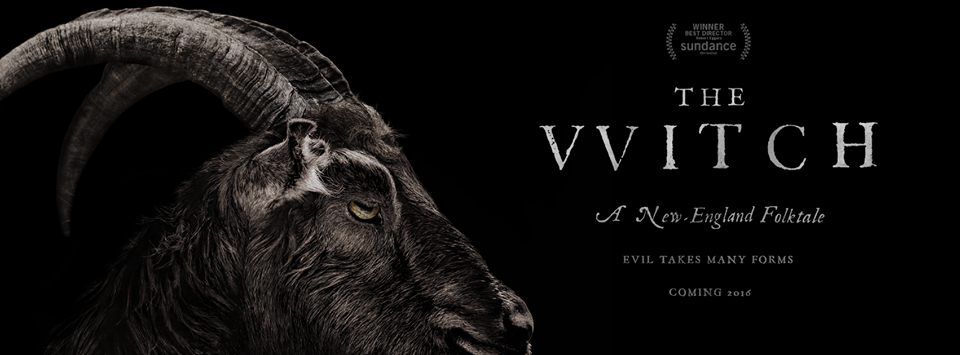 While many Christians heard about the Satanic Temple’s support of Robert Eggers’ creepy 1630 horror flick “The Witch“ and ran the other way, I had the alternate instinct: the devilish endorsement made me want to check it out and give an informed review. I’m glad I did…the absurdity of the Satanic Temple’s pronouncement is as laughable as the notion that this film offers anything in the realm of an anti-Christian message, or anything resembling female empowerment or agency.
While many Christians heard about the Satanic Temple’s support of Robert Eggers’ creepy 1630 horror flick “The Witch“ and ran the other way, I had the alternate instinct: the devilish endorsement made me want to check it out and give an informed review. I’m glad I did…the absurdity of the Satanic Temple’s pronouncement is as laughable as the notion that this film offers anything in the realm of an anti-Christian message, or anything resembling female empowerment or agency.
I remember growing up and hearing accusations that “Christians tend to read too much into everything”. It’s head-shaking to see how far people will stretch a narrative counter to their own aims in a misguided attempt to laud what they believe in, and this time it’s not Christians who are the culprits.
The film begins with a man who’s at loggerheads with his Puritan church leaders: we aren’t told the nature of their dividing interpretations of the gospel, but the man (William) rejects correction or keeping silent and chooses banishment, for himself and his family of five (with the sixth on the way). The film paints him as willful, but not the raving, over-the-top tyrant one comes to expect from most anti-religious films. He’s stubborn and flawed and takes his family into the wilderness. In effect, he’s rejecting his community and culture and choosing his own sense of agency for himself and his household.
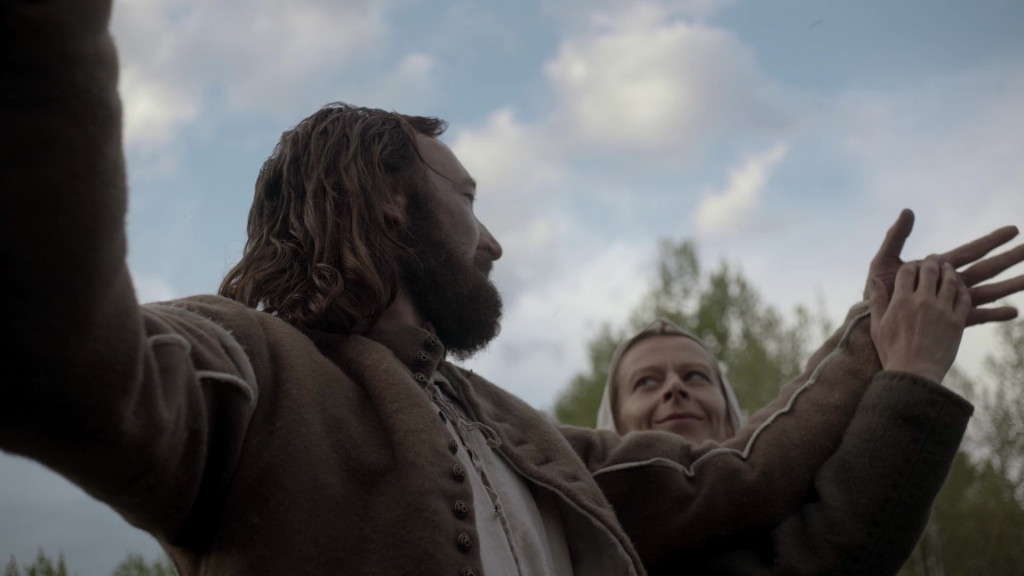
But we’ll come back to that…
Obviously, it doesn’t go well: first the baby disappears under the watch of the oldest sister Thomison (the film’s protagonist and main point-of-view). Tension mounts, but the film plods more like a period drama with creepy horror elements: traditional horror fans may be bored. Three people walked out at our viewing at various points. What’s most fascinating is the authentic period speech (which some may admittedly find a little hard to follow). While the mother is convinced they’re cursed for leaving community and church, William perseveres in his stubborn isolation…until it’s too late. They ARE cursed, family members are going to die, and things are going to end in the most tragic way possible.
Like Paranormal Activity, or even The Exorcist, this is a cautionary tale.
What’s fascinating is how even-handed the portrayals are. Instead of being obvious and mocking religion, we see real people struggling with real questions about their religion and worldview: are they cursed? Where do unbaptized babies go? Is a deceased family member in hell? Why isn’t God intervening miraculously? The narrative boils over with accusations that Thomasin is a witch, but instead of a story where the patriarchal father is the driving force of judgment, he defends her against accusations from siblings and mother. When William’s fears bring him to a turning point, Thomasin fires back equal accusations against her siblings. Everyone is locked in fear, poor decision-making, and hypocrisy. Thomasin reaped the accusations against herself by threatening her little sister earlier in the film, asserting mockishly that she WAS a witch; that poor choice of sibling torment simply comes back to haunt her.
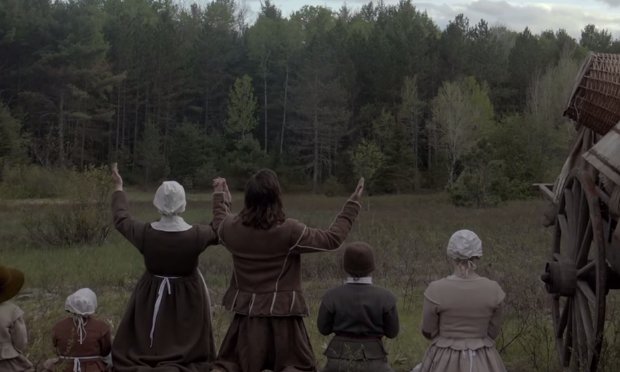
But let’s talk about the “witches” that turn out to be real here: they eat babies. They bathe in the blood of infants. They seduce young boys on the cusp of pubescence and then inflict torment that leads to death. They rip apart the family dog and feast on raw animal entrails. They’re naked, gnarled crones only lacking a broomstick to complete the Halloween stereotype (my wife said one of them actually had a broomstick). And yet… the Satanic Temple would have us believe this is a choice preferable to living in a religiously repressive society? Apparently “out of the frying pan, into the fire” is trading up?
Let’s actually look at the narrative of the film, and not what one might bring to it:
- The story begins with a parent turning their back on community in search of self-agency: things seem idyllic at first, but take a turn for the worse and end horribly.
- In the end, a child makes an even darker choice to obtain a semblance of their own agency. The film shows us that their next moments seem idyllic… and the credits roll.
What is the point here?

And how can so many people willfully miss it?
(Significant spoilers follow.)
In the third act, once two siblings have perished and mother’s mind and soul seem lost, the father – William – gets down on his knees and repents…quite earnestly, and quite comprehensively. He takes the blame for taking his family into danger, for his lies and deceits, for the sin of pride, more: he pleads for mercy. These pleas aren’t even for himself, but selflessly for his family. It’s another rare movie moment where we don’t see a Christian caricature until the end. William realizes many mistakes and asks God for forgiveness in an extremely moving scene.
However, as we see even in biblical history, sometimes confession and stated repentance doesn’t lead to a reversal of temporal fortunes: God doesn’t always spare us from the consequences of our actions in this life. In the end, daughter Thomasin is left alone with virtually no sane options. In the face of a seemingly impossible situation, she makes a deal…a bargain that the actress, Ana Taylor-Joy says, is a happy ending “because it was the first choice she really got to make” in a repressed, puritanical society.
Really? Even KillScreen.com asks the question “How can Thomasin’s story be one of female empowerment when, as the final scenes imply, she chooses Satan because she literally has no other choice?” Worse, her “newfound freedom” comes by LITERALLY signing away her soul to a very male-looking demon named Philip:
Thomasin: I cannot write my name.
Black Phillip: I will guide thy hand.
This equally patriarchal, demonic figure (who has orchestrated the whole-sale slaughter of her family) not only takes her into his embrace, he literally “guides her hand” into signing her soul away. Female empowerment FTW? I mean, I guess she gets to levitate with the other crones, and takes momentary enjoyment in newfound powers (alongside, presumably, the crone who feasted on the family baby and possessed and killed her beloved younger brother Caleb). Huzzah!
Jesus said to them, “If God were your Father, you would love me, for I came from God and I am here. I came not of my own accord, but he sent me. Why do you not understand what I say? It is because you cannot bear to hear my word. You are of your father the devil, and your will is to do your father’s desires. He was a murderer from the beginning, and does not stand in the truth, because there is no truth in him. When he lies, he speaks out of his own character, for he is a liar and the father of lies.”
– John 8:42-44
Menawhile, the Satanic Temple’s mission is allegedly “to encourage benevolence and empathy among all people, reject tyrannical authority, advocate practical common sense and justice, and be directed by the human conscience to undertake noble pursuits guided by the individual will.” Seeing as how the witches in The Witch are anything but benevolent, this doesn’t jive. And if one’s “agency” is preferable (above servitude to other humans) to the point of choosing to cannibalize infants, bathe in their blood, live with hideous crones in the woods, and enjoy a “delicious” life of tormenting and killing other people…wow.
Liberation sounds “awesome”.
Making this about female empowerment or freedom of any kind is an odd stretch by anyone’s imagination. Even the purported tenets of the Satanic Temple don’t add up stacked against the narrative. People.com notes that they “professes to believe in no supernatural forces – devil-related or otherwise” but rather “uses traditional Satanic imagery to push its core tenet of using science and reason to understand the world.” Funny, then, that the film offers an undeniably real existence of demonic forces and that power as the very allure that leads Thomison astray.
Other goals of the Temple allegedly “include supporting women’s reproductive rights, supporting abuse victims (especially victims of sexual abuse by priests), and rescuing black cats.” Hurray for the cats, but how does the right to abduct and eat the product of a woman’s reproductive rights fit this mold? How about the witch’s sexual abuse of Caleb, which starts seductively but turns violent? Just as William find himself a hypocrite in the film, these proponents of Thomasin’s decision find themselves equally compromised.
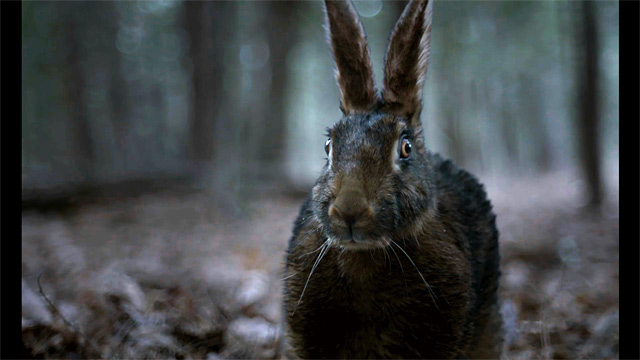
Finally, they say of the film: “it features a declaration of feminine independence that both provokes puritanical America and inspires a tradition of spiritual transgression.” The last element is clear, without question, and yet the ultimate “spiritual transgression” enslaves Thomasin to an even darker father…whose pride is greater and evil is ultimately all-consuming. Even if William deserves condemnation, Thomasin’s embrace of Philip is the 1630 equivalent of voting for Cthulhu over Donald Trump: I mean, why settle for the lesser of two evils?
“Be sober-minded; be watchful. Your adversary the devil prowls around like a roaring lion, seeking someone to devour. Resist him, firm in your faith…”
– 1 Peter 5:8-9a
Ultimately, a prideful father leaves his Christian enclave seeking self-determination where – despite a short time of joy building a home in the wilderness – he reaps horrible results that lead to his temporal death…and devastating consequences for his household. His child goes one step further for her own self-actualization and – despite a short period of joy flying high in the forest – will reap a horrible result that leads to eternal death. If there is any female empowerment or equality to be had here, it’s simply this:
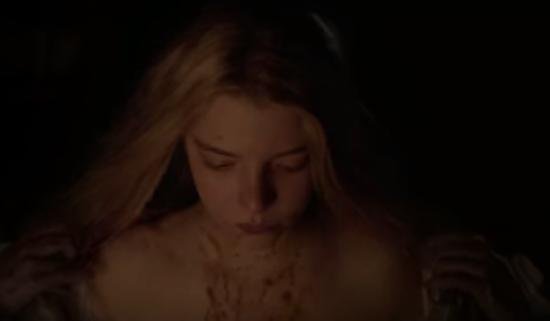
Bible verses that say the sins of the father will be visited on the son (Exodus 20,34, Numbers 14) clearly include daughters as well.
The classic period language and woodland experience were actually quite fascinating to watch. The (non-sexualized) nudity will turn some away. I didn’t love it, wouldn’t highly recommend it, but considering what I was expecting… I was impressed. It’s a classic tragedy, that apparently some will blindly miss for the shortsighted smile Thomison bears at film’s end. Then again, short-sightedness seems to be the Satanic Temple’s chief ideas:
“We will challenge those who slander the nature of man for there is no greater crime than to deny this world in favor of the next. To disobey is to be free.”
Yeah. Good luck with that.



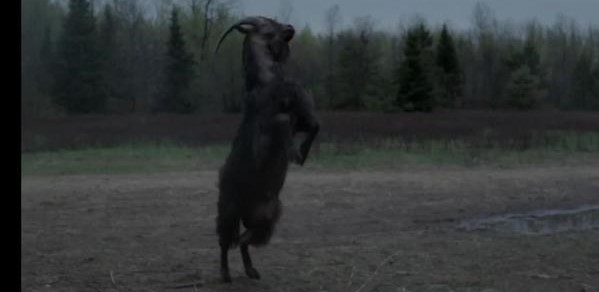
[…] on Rotten Tomatoes The Witch Review at Reel World Theology The Witch Review at Reel Spirituality The Witch: Agency for Eating Babies at Cinemagogue The Witch: A Review and Some Thoughts on Christians and Horror Movies at Think […]